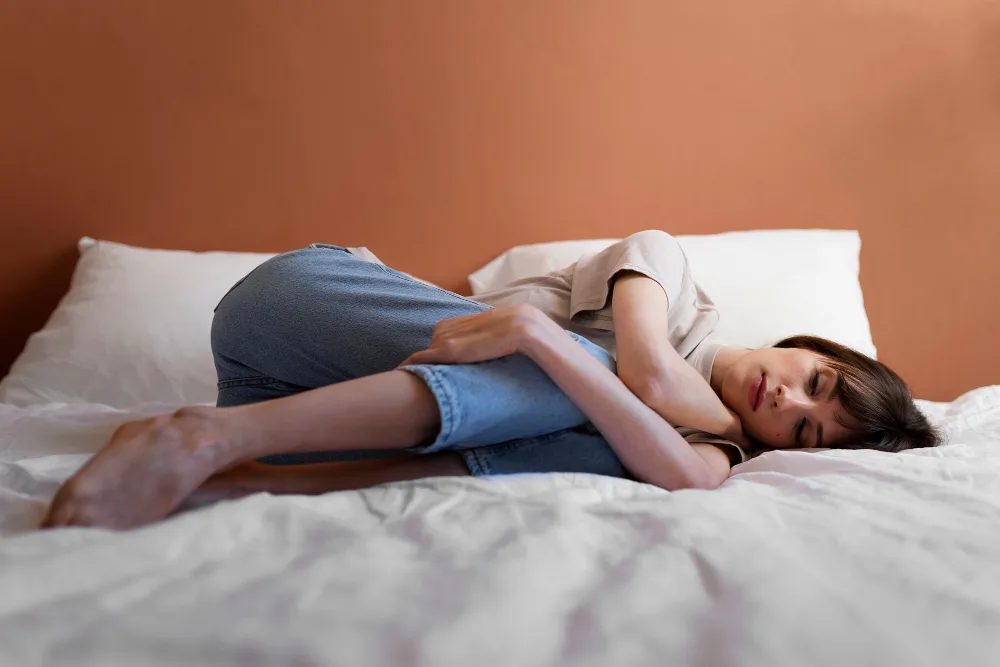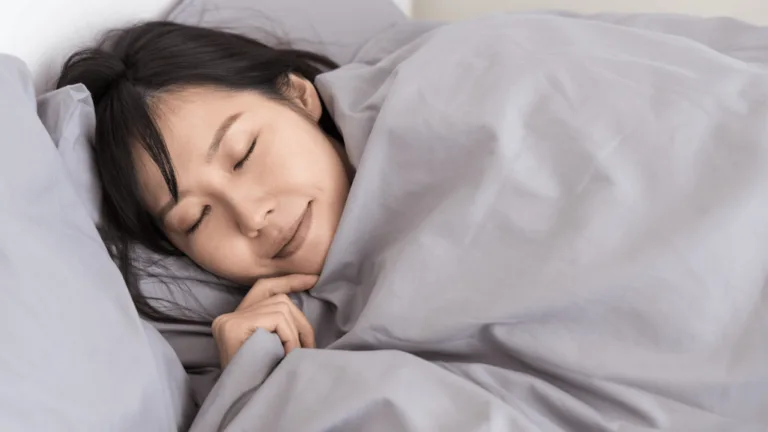Sleeping correctly is key to good posture, the University of Rochester Medical Center tells us. They say sleeping on the stomach might be better without a pillow. This could cut down on neck pain and keep the spine straight. Weight in the body pulls on the back and neck when sleeping on the stomach. Removing the pillow could ease this, making their sleep more healthy. But, if you sleep on your back or side, a pillow is vital for good spine alignment.
Key Takeaways
- Stomach sleepers may see improved spinal alignment by sleeping without a pillow.
- Most research has focused on pillow types rather than sleeping without a pillow.
- For back and side sleepers, a pillow is still recommended to maintain spine neutrality.
- Not using a pillow can place additional stress on the neck and back in stomach sleepers.
- Consulting a doctor before changing sleep habits is advised, especially for those with existing neck or spinal conditions.
Benefits of Sleeping Without a Pillow
Not using a pillow can be great for certain sleeping styles. Most of your body’s weight lands on your midsection when you sleep face down. This puts pressure on your neck and back. So, not having a pillow can help those who sleep on their stomachs.
Reduced Back Pain
Sleeping without a pillow can lower back pain. Pillows can mess with your spine’s natural shape, which might make pain worse. This is especially good for those who sleep on their stomach. It helps keep the spine straight and can reduce pain.
Alleviating Neck Pain
It’s also good for easing neck pain. Sleeping without a pillow lets your head lie more naturally. This can lower the strain on your neck, making it feel better over time.
Improved Sleep Quality
Not using a pillow can make your sleep better. It stops you from getting uncomfortable due to bad head and neck positions. No more headaches from poor blood flow or stress from constant shifting. Using pillows for good body support everywhere else helps keep you comfortable.
Prevention of Facial Acne
Sleeping without a pillow can even help prevent acne. Pillowcases gather bacteria, dirt, and oil, which can cause pimples. Without a pillow, you’re not exposed to these skin irritants as much. This could lead to a clearer face.
It can really change your sleep for the better by ditching the pillow. Small changes in how you sleep can really make a difference. They ensure you get a restful and healthy sleep every night.
Posture Benefits of Sleeping Without Pillow
Sleeping without a pillow can be especially good for those who sleep on their stomachs. A study from the University of Rochester Medical Center found that stomach sleeping can strain the spine. This happens because the body’s weight pushes into the center. Without a pillow, your head stays lower, which can ease the strain on your neck and spine.
But, not using a pillow isn’t always the best idea. It can mess with the alignment of the spine for back or side sleepers. Usually, a pillow helps support your head and neck, keeping your spine in a good position. Some experts say, if you want to quit using a pillow, do it slowly. Decrease the height of your pillow gradually to protect your spine.
Sleeping the right way without a pillow means you need a good mattress too. Your mattress should support your spine well. Failing to get the right support from your mattress can cancel out the benefits of not using a pillow. So, if you’re going pillow-free, also make sure your mattress is top-quality.
In the end, the effects of sleeping without a pillow depend on you and how you sleep. It can be really helpful for stomach sleepers. But, for others, it might not be as good. If you’re thinking about ditching your pillow, watch out for any aches or pains. Listen to your body and make sure you’re okay with the change.
Does Sleeping Without Pillow Help Posture?
The debate over does sleeping without pillow help posture still gets people talking. Let’s look at stomach sleepers. Not using a pillow might keep their neck flatter. This could help their back and neck feel better, since their body’s heavy part is near these areas.
Many studies look at the best pillow for good posture. Not so much on sleeping without one, though. The benefits depend a lot on how you sleep. For stomach sleepers, not having a pillow might be good. But for those who sleep on their back or side, pillows are usually better for their spine.
Stomach sleepers may find it easier on their neck without a pillow. But what about back or side sleepers and their posture? For them, using a pillow is often recommended to keep their spine in line.
While the pillow or no-pillow debate goes on, solid proof is lacking. But, putting a pillow under some specific areas can help. It might be good for stomach sleepers. Back and side sleepers, though, need a different strategy.
The real deal about does sleeping without pillow help posture depends on how you sleep and your body. We need more research to give a clear answer.
Sleep Posture Improvement Without Pillow
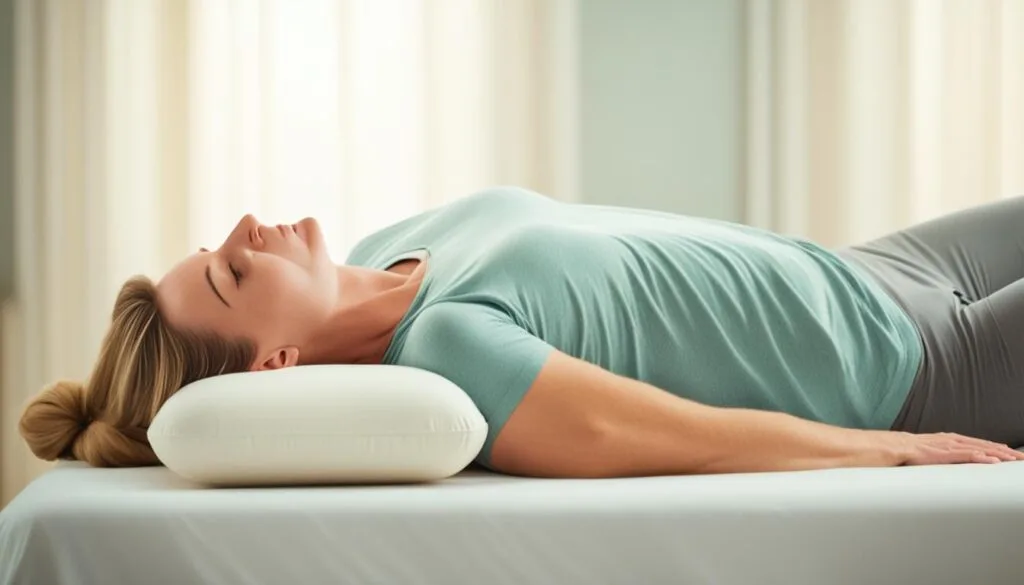
Many people ask if not using a pillow can fix how they sleep. This is especially true for those who sleep on their stomach. They might find their spine is better aligned without a pillow.
Spinal Alignment
Sleeping on your stomach makes your spine bend in an odd way. This is because most of your weight is in the middle of your body. Not using a pillow might help ease the strain on your back and neck. It aims to keep your spine’s shape more natural.
Reduces Strain on Muscles
Research shows that sleeping without a pillow can make your muscles less tense. For those who sleep on their stomach, a flatter head position means less stress on their neck. It can be good for them, but not for everyone. Other sleep positions might need more support for the spine.
Improved Breathing
It’s also said that sleeping without a pillow may help you breathe better. Without the lift of a pillow, your airways might stay clearer. But, this works best for stomach sleepers. Others, like back or side sleepers, could benefit more from using a pillow.
In short, not using a pillow could really improve how stomach sleepers rest. But, it’s important to think about what’s comfortable and healthy for you. The effects might vary depending on how you sleep.
Potential Downsides of Sleeping Without a Pillow
Many people see the good in sleep sans pillow. But, it’s key to note its cons, especially for back and side sleepers. A lack of *back support and pillows for sleep* can wreck your posture. This can make your joints and muscles hurt more.
*Back support and pillows for sleep* help back sleepers keep their spine’s natural shape. Without a pillow, their necks might stretch too far. This could make them feel stiff or sore. It might even make neck pain worse.
Pillows help the neck muscles share the weight of your head evenly. Without this, your neck might get sore. It could even get strained over time.
Side sleepers face similar troubles without the right support. They may not align their spine properly without *back support and pillows for sleep*. Such bad alignment can hurt the shoulders and back. Experts say the right pillows are crucial to avoid this stress and enjoy a better sleep.
Certain studies found that wrong pillow support could cut off blood flow to the neck and head. Use pillows that are just right, not too soft or hard, to avoid this. Choosing the best pillow for your style of sleep is very important.
Also, consider the risk of allergies and poor hygiene without pillows. Change your pillows often to avoid allergies. Yet, choosing no pillow might help reduce risk somewhat. Always keep your sleep area clean to fight allergens.
Correct Sleep Posture Without Pillow
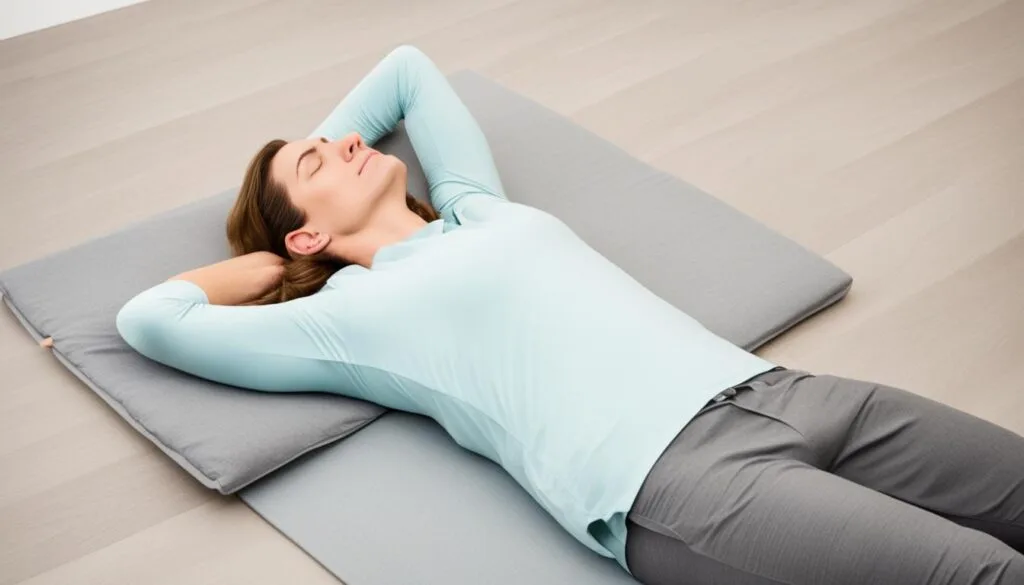
To sleep right without a pillow, you need to adjust how you lay down. It’s important for your back to be straight and your body to be comfy. Doing this can fix many issues and make your sleep better. But, it’s different for everyone.
Stomach Sleeping
For those who sleep on their bellies, not using a pillow can be good. When you sleep face down, your spine might twist. To help, put a pillow under your stomach and hips. It’ll keep your spine straight, easing back and neck pain.
Back Sleeping
Back sleepers find it harder without a pillow for their head. But, a pillow under the knees can help. It takes stress off your spine, making sure it stays curved like it should. This way, you can sleep well even without a pillow.
Side Sleeping
Side sleepers really need a pillow for their back’s health. Without it, your spine could bend wrong, causing pain. A big, firm pillow is best. It supports your neck and shoulders, keeping your spine straight from top to bottom.
Choosing the Right Mattress
Picking the right mattress is key for our health. The perfect balance of firmness and support ensures our spine is in the right position. This not only keeps us comfortable but also protects our health.
Firmness and Support
The mattress’s firmness affects our spinal care. Too soft, and our spine might not be supported. Too firm, and it could pressure our joints.
It’s crucial to find a mattress that suits your needs. Your sleeping position matters a lot. People who sleep on their sides or backs often do better on medium to firm mattresses.
Mattress Lifespan
Mattresses usually last 6 to 8 years. But, over time, even great mattresses stop supporting us well. This can lead to discomfort and harm our spine.
Checking your mattress regularly and replacing it when needed is vital. It keeps our sleep quality high and protects our back.
Partner Considerations
If you share your bed, think about what both of you need in a mattress. You might both have different body types and sleep needs. Choosing a mattress with zoned support or adjustable firmness can help both of you sleep better and healthier.
| Consideration | Requirements |
|---|---|
| Firmness and Support | Medium to firm for side and back sleepers |
| Mattress Lifespan | Replace every 6-8 years |
| Partner Considerations | Zoned support or customizable firmness |
Choosing the best mattress and pillow improves how we sleep and our health. Knowing what you need, and what others do, can make you choose well. This brings better sleep and well-being for everyone.
Back Support and Pillows for Sleep
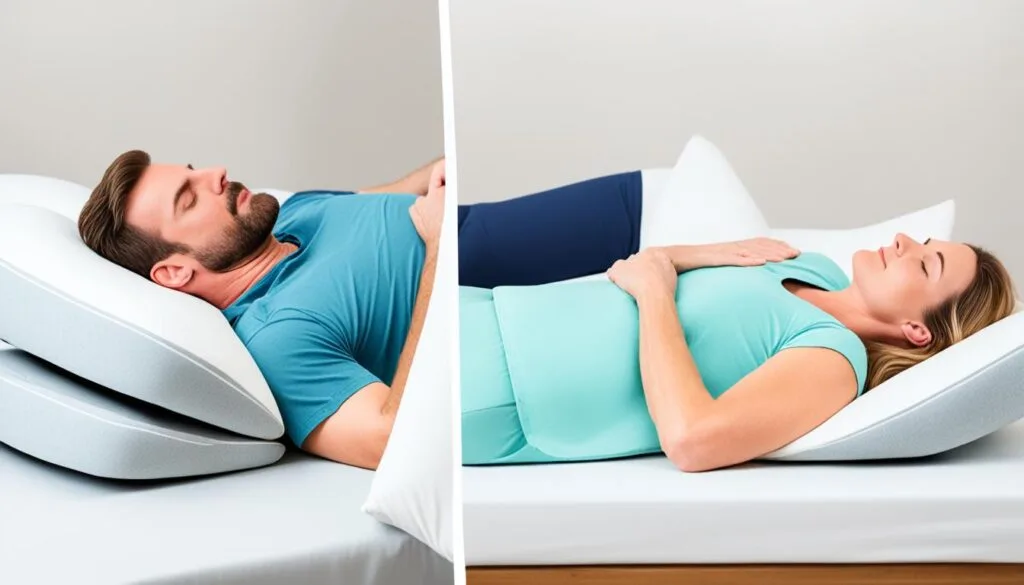
Having the right back support and pillows helps keeps your spine’s natural curve as you sleep. It also helps get rid of discomfort. There are many types of pillows that work best for keeping your spine straight. This includes cervical, contour, and orthopedic pillows. Each is made for different needs.
| Type of Pillow | Benefits |
|---|---|
| Cervical Pillow | Supports the neck’s natural curve, beneficial for those with sleep-related neck pain |
| Contour Pillow | Adapts to the shape of the head and neck, promoting consistent alignment |
| Orthopedic Pillow | Specifically designed to correct body positioning and provide targeted support |
If you sleep on your stomach, not using a pillow is better. It can help lower neck stress. Yet, for side or back sleepers, not having the right support causes spine issues. If you often feel discomfort from sleep, choosing the correct pillows is key.
Best Pillow for Posture Improvement
Choosing the best pillow for better posture is key for good sleep. The right one helps keep your spine straight and lessens muscle strain. Your pick should match your sleeping style and body shape.
Cervical Pillows
Cervical pillows are great for your neck’s natural curve. They keep your neck and head in line with your spine. This reduces neck pain and is good for back sleepers. Sleep Foundation recommends these for spine health.
Contour Pillows
Contour pillows adjust to your head and neck shape, ensuring custom support. They relieve pressure and keep your head in a comfy, natural position. People who sleep on their sides or backs like them. These pillows help keep your spine straight, preventing back or neck pain.
Orthopedic Pillows
Orthopedic pillows offer even more, designed for the best body position in bed. They come in many shapes and sizes for specific needs, like easing back pain or supporting your neck. You can use them for sleep or for reading in bed. They keep your posture right all day and night.
Choosing the right posture pillow is all about knowing how you sleep and what your body needs. Whether it’s a cervical, contour, or orthopedic pillow, focus on keeping your spine neutral. This improves how you sleep and cuts down on aches and pains.
Tips for Transitioning to Pillowless Sleeping
Switching to pillowless sleep is a big step, especially if you’re used to lots of pillows. Still, it can be a positive change with the right approach.
Gradual Reduction
Start reducing your need for a pillow slowly. This way, your body gets used to less support over time. Using folded towels can be a great way to slowly lower your pillows’ height. This method helps avoid sudden discomfort and makes the transition easier.
Body Support with Pillows
Even without a traditional head pillow, use other pillows to support your body. Placing pillows under your stomach or knees keeps your spine aligned well. This step is key in maintaining good posture. For those who sleep on their stomach, support under the pelvis can also help.
Choosing the Right Bed
| Mattress Type | Benefits for Pillowless Sleeping | Recommended Sleepers |
|---|---|---|
| Memory Foam | Offers close conforming and natural neck support | Stomach and back sleepers |
| Hybrid | Blend of foam and coils; medium-firm settings are suitable | Side and back sleepers |
The right mattress is crucial for pillowless sleep. A memory foam mattress contours to your body, supporting the natural curve of your neck. Hybrids, mixing foam and springs, offer a supportive, medium-firm option. Selecting the right bed is vital, ensuring you get the support you need for better sleep.
Studies on Sleeping Without Pillows
Research into the benefits and drawbacks of sleeping without a pillow is not extensive. Most studies focus on what pillows are best for your back. But, studies on sleeping sans pillows are few and far between. According to the University of Rochester Medical Center, people who sleep on their stomachs might find it better to skip the pillow. This could help lower neck strain.
For those who sleep on their stomachs, going pillow-free could be beneficial. This is because it reduces spine stress. People who have tried this say they’ve felt less pain in their necks and backs. However, we need more research to see if not using a pillow is good for your overall posture.
Side and back sleepers are advised to use pillows for their spines. Pillows help keep the spine aligned well. This is especially important for people who sleep on their back or side. Stomach sleepers, on the other hand, should avoid pillows or choose very thin ones. This is better for keeping their spine in good shape.
In terms of hair health, there isn’t strong research supporting the idea that pillows are bad. But, some evidence does show that sleeping without pillows could be good for blood flow. This might lower the chances of allergies, asthma attacks, and help with acid reflux and heartburn.
| Sleeping Position | Recommendations |
|---|---|
| Stomach Sleepers | Avoiding a pillow or using a low-loft pillow can align the spine better and reduce neck strain. |
| Side Sleepers | Using a firm, thick pillow helps fill the gap between the neck and shoulders. |
| Back Sleepers | A medium-high pillow is recommended to keep the neck aligned with the spine. |
The topic of sleeping without a pillow is interesting for health. Yet, we need more studies to confirm its benefits. This would offer solid advice for everyone’s sleep position.
Conclusion
Sleeping without a pillow might seem good for stomach sleepers. However, it’s better for side and back sleepers to use one. It helps keep the spine straight. Still, your own comfort comes first.
A study from 2011 showed something interesting. More than 50% of people didn’t like their pillows. They had trouble sleeping well. This suggests that the wrong pillow can hurt your sleep.
There isn’t much solid research on the topic. But not using a pillow could have some bad effects. For example, it might worsen conditions like sleep apnea. It could also lead to neck and back pain.
Choosing the right pillow is especially important for side sleepers. They need a pillow that is firm and thick. This keeps the body in a good position while asleep.
Health problems like cervical spondylosis and herniated discs are key. It’s important to think about this if you’re considering not using a pillow. Good sleep posture is vital for everyone. This includes choosing the best mattress and pillow. For more on sleeping without a pillow and its effects, you can check this resource out.

